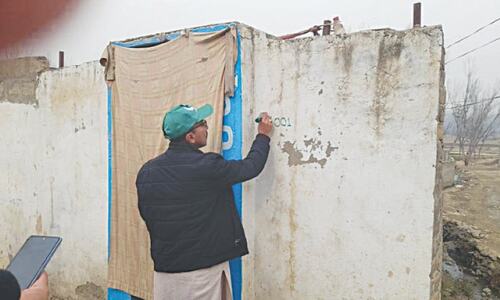ISLAMABAD, Dec 28: Finance Minister Shaukat Aziz said on Friday that the country was estimated to suffer an almost $2-3 billion loss during the current financial year in the wake of Sept 11 events.
“To offset this damage the government has taken a number of steps with a view to restoring international confidence in Pakistan’s geostrategic position,” he said at the 9th meeting of the Economic Advisory Board.
The minister told the meeting that the flow of cash grants coupled with stringent economic watch had muted the effects. “Now, since the war in Afghanistan is almost over, the normalcy is returning fast, enabling entrepreneurs to effectively engage their international counterparts in promoting Pakistan’s exports,” he said.
The EAB meeting was convened to review the post-Sept 11 economic scenario in the country, said an official announcement,.
Giving a resume of the country’s economic performance, Mr Aziz said that Pakistan had entered the post-Sept 11 economic crisis with confidence. The country then completed the first IMF programme restoring confidence of the international financial institutions. The economic sanctions imposed on the country were removed. The international financial institutions reposed confidence in Pakistan’s economic health and set in motion a series of international commitments, including $1.3 billion PRGF, rescheduling by the Paris Club and increased assistance from the World Bank, IMF, ADB as well as bilateral donors.
Pakistan, he said, witnessed sharp reduction in fiscal and current account deficit, industrial production registered a growth of over 8 per cent, tax collection increased in double digit, inflation was contained, remittances from overseas Pakistanis reached an all time high $260 million in December from an average of $81 million per month.
He said the gross foreign exchange reserves crossed the $4.7 mark. As a result of lifting of sanctions, he said, the cash grants started flowing into Pakistan. So far, the country had received cash grants of Rs40 billion out of which Rs15 billion was being utilized on the human development programmes.
The government increased federal allocations during the current fiscal for Khushal Pakistan Programme from Rs7 billion to Rs15 billion, education from Rs2.5 billion to Rs4.5 billion, health from Rs2.5 billion to Rs4.5 billion, and school feeding to Rs1 billion, which, he added, had proved the government’s resolve for welfare of people.
The successful completion of IMF programme was followed by the Poverty Reduction and Growth Facility amounting to $1.3 billion. All these developments helped Pakistan to effectively and aggressively pursue the stock profiling of $12.5 billion bilateral loans in the Paris Club with unmatched facilities which had so far been given only to a few countries including, Egypt, Poland and Yugoslavia, resulting in 30pc reduction of loans at the current prices.
The entire stock of ODA loans, he said, was reprofiled for 38 years with 15 years grace period and added that the commercial debt was reprofiled for over 23 years with five years grace period.
Pakistan, he said, would now negotiate with bilateral donors to further reduce the interest rate to make Paris Club reprofiling even more enviable. Soon, he said, the country would negotiate with the United States, Japan, Germany, France and Korea. The other redeeming factor, the minister recalled, was export credit facilities given by the OPIC, EXIM, HERMES and the Japanese Export Import Credit Bank.














































Dear visitor, the comments section is undergoing an overhaul and will return soon.